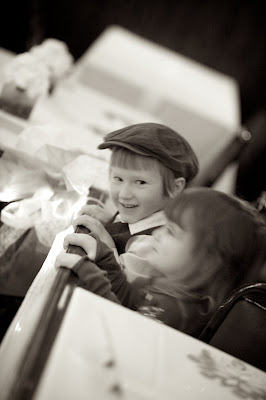We've all had a cold going around. Gibbie had a screaming ear infection. Paul and Ezra and I had sore throats. It seemed we were all getting better, but then Ezra got worse. I

t changed from sleeping a lot and coughing miserably to complete listlessness and shallow breathing. I consulted with our doctor/ friend/ neighbor who said it looked and sounded like he had pneumonia. We went in to the clinic, where everyone was very concerned. The doctor had a great bedside manner. He was quiet and watched Ezra intently. They did xrays and checked the levels of oxygen in his blood, which weren't high enough for peace of mind.
He gently explained that Ezra would probably do fine at home, but that labored breathing is very tiring for children and advised that we head down to Children's Hospital "very quickly."
I've not had many emergency room experiences, but they seem to normally entail a lot of waiting. Boy, did they whisk him into a room quickly!
He was so tired and had so little energy that he barely protested anything they did. It's strange-- I'm used to having full control over every little thing that happens with my little ones (I know you laugh, parents of older children!) but in the hospital, they don't ask permission for everything--you've given permission for them to treat and they largely just tell you what they are doing, if there is time.

Pretty soon we were given a private room. Ezra slept and nursed and I watched as his oxygen levels rose reassuringly. It was rather peaceful. About two dozen people came and went, all nicely explaining things and trying to examine him without scaring him; there were just so many different people! The whole experience was completely new to me, and made me realize how healthy and fortunate we have been. No one in my immediate family was ever hospitalized, and my kids were born at home, so my only hospital experiences had been as a brief visitor. I noticed a piece of equipment in our room donated in honor of a child cancer survivor, and paid silent homage to children and parents who have spent so much time in those rooms.
I noticed at one point, everyone who came into the room suddenly had on a face mask and smock. I guess they had to because of an alert put on our room for risk of whooping cough contagion.
(for any worrier-readers, be assured; ezra doesn't have whooping cough.)Our room had a lovely view of the Cathedral and the James J. Hill house, and some lovely sunshine; familiar sights which somehow made me feel more grounded. I just love seeing the Cathedral with it's cross atop all lit up reassuringly at night, as if to say, "there's still a light on here."
It seemed like an age passed before morning came, but bit by bit, especially after he woke up and had some juice, Ezra started to perk up. He told me at one point that there was a lion-cat going around the room and had some other diverting news, which I think was his way of entertaining himself.

He wished to see papa, and Opa, and Gibbie, and mused that maybe Opa would come to Ezra's next birthday dressed up in a Lion costume! Of course, he desperately wanted all his tubes off. Not long after Paul arrived, he was joking around.
Many thanks to everyone who prayed and sent supportive thoughts and phone calls, to Oma for taking Gibbie in the morning, Opa for lunch, Dave for the cheering visit and thoughful gifts of food and elephant. Special thanks to Super Wendy for being so great about everything; medical help, childcare, car-sharing, kid-made cards, Ezra-delighting gift, and the delicious follow-up recovery meal!
Paul commented that, if I didn't have any complaints,
Children's must be a stellar hospital. I must say, as one who has gone to some length to avoid contact with hospitals, Ezra was treated with great respect and care. It was more welcoming than I thought a trip to the hospital could be.
As to any lingering concerns, Ezra is "out of the woods," breathing quite normally, and generally running and jumping around the house as though he had never done otherwise.
(though we plan on staying nested in here, recuperating for a while to get completely well.) He said when questioned that he liked his tubes, which I'm quite certain he did not at the time. I think during the miserable parts he was so hazy he doesn't remember them; his most vivid recollection so far is the fun "cat, chick-egg bandaid"
(garfield, for the rest of us) they gave him when they took out his IV. Thank God for health and healing. Thank God for friends and family. We have so much to be thankful for.
 Here are some more pictures of our bonnie lads. In our dear friends' wedding this past December. Remember all those kilts we made? This was the occasion: the marriage of our dearest, and one of my longest-standing friends, Pat. Or Uncle Otter, or Patter, as the kids call him. Paul was the best man and they entrusted our bairns with the rings.
Here are some more pictures of our bonnie lads. In our dear friends' wedding this past December. Remember all those kilts we made? This was the occasion: the marriage of our dearest, and one of my longest-standing friends, Pat. Or Uncle Otter, or Patter, as the kids call him. Paul was the best man and they entrusted our bairns with the rings.















